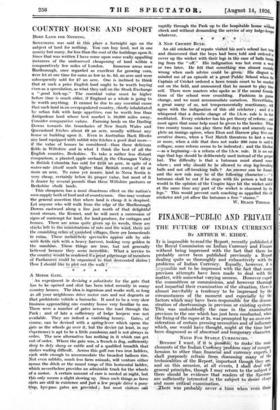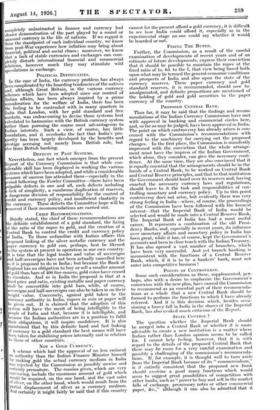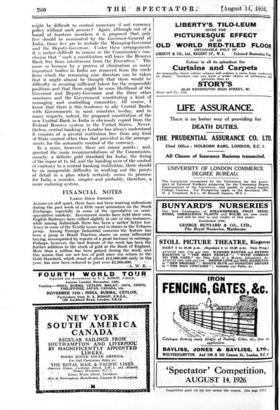FINANCE-PUBLIC AND PRIVAT E THE FUTURE OF INDIAN CURRENCY .
BY ARTHUR W. KIDDY.
IT is impossible to read the Report, recently published, of the Royal Commission on Indian Currency and Finance without being impressed with the fact that there ha probably never been published previously a Report dealing quite so thoroughly and exhaustively with the problems of Indian Currency. Equally, however, it is possible not to be impressed with the fact that many previous attempts have been made to deal with the matter, with somewhat varying success. However expert the committees or commissions, and however thorough and impartial their examination of the situation, there is almost inevitably a tendency to be impressed by the circumstances of the moment and especially by the factors which'inaY have been responsible for the demon. Stration of shortcomings in previous or existing systems. This was undoubtedly the, case in the examination previous to the one which has just been conducted, when the fixing of the rupee at 2s. was prompted by an over-coa- sideration of certain pressing necessities and of influences which, one would have thought, might at the time hate been diagnosed as of abnormal and temporary character.
NEED FOR STABLE CURRENCIES.
• .
:Because I Want, if -it is possible; to Make the main elements of the Indian Curt/ericy 'problem easy of compre- hension to other than financial and currency experts,1 shall purposely refrain from_ discussing many of the technicalities of the Report, important though they are, and on this occasion, at all events, I shall deal with general principles, though I may return to the subject if there should be evidence that readers of the Spectate are sufficiently interested in the subject to desire closer and more critical examination. was probably never -a time when - even thoF completely uninstructed in finance and currency had clearer demonstration of the part played by a sound or unsound currency in the life of nations. If we regard it from the standpoint of each individual country, we know from post-War experience how inflation may bring about financial, political and social chaos ; moreover, we know that a lack of stable currencies and exchanges can com- pletely disturb international financial and commercial lations, however much they may stimulate wild speculations in exchange.
POLITICAL DIFFICULTIES.
In the case of India, the currency problem has always been complicated by the hoarding tendencies of the natives d, although Great Britain, in the various currency hemes which have been adopted since our control of ndian affairs, has been always inspired by a prime nsideration for the welfare of India, there has been he feeling to be contended with in many quarters in ndia that- London, with her gold standard and free arkets, was endeavouring to devise those systems best leulated to harmonize with the British currency system ther than pursuing the course most advantageous to ndian . interests. Such a _view, of course, has little oundation, and it overlooks the fact that India's pro- perity has been largely developed by the benefits and restige accruing not merely from British rule, but so from British banking.
DEFECTS IN PAST SYSTEMS.
Nevertheless, one fact which emerges from the present eport of the Currency Commission is that while con- iderable skill has been displayed in working the various ystems which have been adopted, and while a considerable ensure of success has attended them—especially in the eriod following the Fowler Committee—there have been Ipable defects in one and all, such defects including lack of simplicity, a cumbrous duplication of reserves, dangerous division of responsibility for the control of redit and currency policy, and insufficient elasticity in he currency. These defects the Committee hope will be moved if their recommendations are carried out.
CHIEF RECOMMENDATIONS.
Briefly stated, the chief of these recommendations are he definite establishment of a gold standard, the fixing f the ratio of the rupee to gold, and the creation of a entral Bank to control the credit and currency policy f India. To those unfamiliar with Indian affairs this roposed linking of the silver metallic currency and the aper currency to gold can, perhaps, best be likened o the system at present in operation in our own country. t is true that the legal tender and value of sovereigns d half-sovereigns have not been actually cancelled here it is proposed to do in India ; but because the Bank of ngland has no obligation to buy or sell a smaller amount f gold than bars of 400 fine ounces, gold coins have ceased circulate. And so in India the proposal is that at a xed price and ratio, existing metallic and paper currency hall be convertible into gold bars, while, of course, rereigns and half-sovereigns can also be taken in on their eight value. Conversely, against gold taken to the rrency authority in India, rupees in coin or paper will e given out. It is claimed that the adoption of this stem will have the merit of being -intelligible to the pie of India and that, because it 'is intelligible, and eeause the Indian authorities are in a position to fulfil heir obligations, it will inspire confidence. It is also maintained that by this definite hard and fast linking of currency to a gold standard the best means will have been taken for stabilizing prices internally and in relation to those of other countries.
NOT A GOLD CURRENCY.
A scheme which had the approval of no less eminent an authority than the Indian Finance Minister himself for making _gold the actual currency medium in India was rejected by the Commission as possibly unwise and certainly premature. The reasons given, which are very convincing, include the enormous amount of ' gold which Would be required, on the one hand, and the vast sales of silver, on the other hand, which would result from the Partial displacement of silver as a currency medium. And Certainly 'it 'Might fairly be said that if this country cannot for the present afford a gold currency, it is difficult to see how India could afford it, especially as in the experimental stage no one could say whether it would be hoarded or not.
FIXING THE RUPEE.
Further, the Commission, as a result of the careful examination of developments of recent years and of an estimate of future developments, express their conviction that it should be possible to maintain the rupee at the fixed ratio of Is. 6d. to the £, that view being based both upon what may be termed the general economic conditions and prospects of India and also upon the state of the currency reserves. These paper currency and gold standard reserves; it is recommended, should now be amalgamated, and definite proportions are mentioned of the holding of gold and gold securities to the paper currency of the country.
PROPOSED CENTRAL BANK.
Thus far, it may be said that the findings and recom- mendations of the Indian Currency Commission have met with approval in banking and commercial circles here, and, so far as may be judged, have been approved in India. The point on which controversy has already arisen is con- cerned with the Commission's recommendations with regard to the machinery for carrying out the proposed changes. In the first place, the Commission is manifestly impressed with the conviction that the whole arrange- ment must have the impress of the Indian Government, which alone, they consider, can give the necessary confi- dence. At the same time, they are also convinced that it is equally essential that the arrangements should be in the hands of a Central Bank, to be worked on Central Bank and Central Reserve principles, and that to that institution the Government should hand over its reserves and, having enacted the necessary currency laws and regulations, should leave to it the task and responsibilities of con- trolling monetary and currency policy. Up to this point controversy does not arise, but evidently there was very strong feeling in India—where, of course, the proceedings of the Commission have been followed with the keenest interest—that the Imperial Bank of India would be selected and would be made into a Central Reserve Bank. The Imperial Bank of India has had a most useful career. It represents a combination of the old Presi- dency Banks, and, especially in recent years, its influence over monetary affairs and monetary policy in India has been great, while it has, .of course, kept the Government's accounts and been in close touch with the Indian Treasury. It has also opened a vast number of branches, which have been very successful. And yet branch banking is inconsistent with the functions of a Central Reserve Bank, which, if it is to be a bankers' bank, must not enter into competitive business !
POINTS OF CONTROVERSY.
Some such considerations as these, supplemented, per- haps, also with a desire to emphasize the Government's connexion with the new plan, have caused the Commission to recommend as an essential part of their recommenda- tions as a whole that a new Central Bank should he formed to perform the functions to which I have already referred. And it is this decision which, besides occa- sioning a heavy fall in India in the shares of the Imperial Bank, has also evoked much criticism of the Report.
STATE CONTROL?
The question whether the Imperial Bank should be merged into a Central Bank or whether it is more advisable to create a new institution is a matter where Indian rather than London opinion seems to be called for. I cannot help feeling, however, that it is with regard to the details of the proposed Central Bank that there may be room for a very careful examination and possibly a challenging of the commission's recommenda- tions. If, for example, it is thought well to turn aside from the Imperial Bank because of its " commercialism," is it entirely Consistent that the proposed new Bank should exercise a good many functions which would seem to suggest - great possibilities of competition with other banks, such as " power to buy and sell in the market bills of exchange, promissory notes or other commercial paper, &c.," although it can also be admitted that it might be difficult to control monetary if not currency policy without such powers ? Again, although out of- a board Of %fourteen members it is proposed that _only five should be nominated by the Governor-General of India, those five are to -include the Managing-Governor and the Deputy-Governor. Under these arrangements it is rather difficult to concur in the Commission's con- clusion that " such a constitution will leave the Reserve Bank 'free from interference from the Executive." The more so because by a process of elimination so many important bodies • in India are removed from the circle from which the remaining nine directors cane he taken that it might almost be thought that there would be difficulty in securing sufficient talent for the responsible positions and that there might be some likelihood of the Governor and Deputy-Governor and the three other nominees and the Government constituting a kind of managing and controlling committee. Of course, I know that there. is this tendency to ally Central Banks with Governments in most : countries,: to4lay,• and in many respects, indeed, the proposed constitution of the new Central Bank in India is obviously copied from the Federal Reserve system in the United States. Never- theless, central banking as London has always understood it consists of a pivotal institution free from any kind of State control other than that provided in the arrange- ments for the automatic control of the currency.
In a sense, however, these are minor points ; and, granted the main recommendations of the Commission, namely.:,- a definite gold atiindaid-- fer.-India the fixing of the rupee at is. 6d. and the handing over of the control of currency to a central banking institution, there should be no insuperable .difficulty in working out the points of detail in a plan which certainly seems to promise for India a sounder, simpler and probably, therefore, a more enduring system.




































 Previous page
Previous page